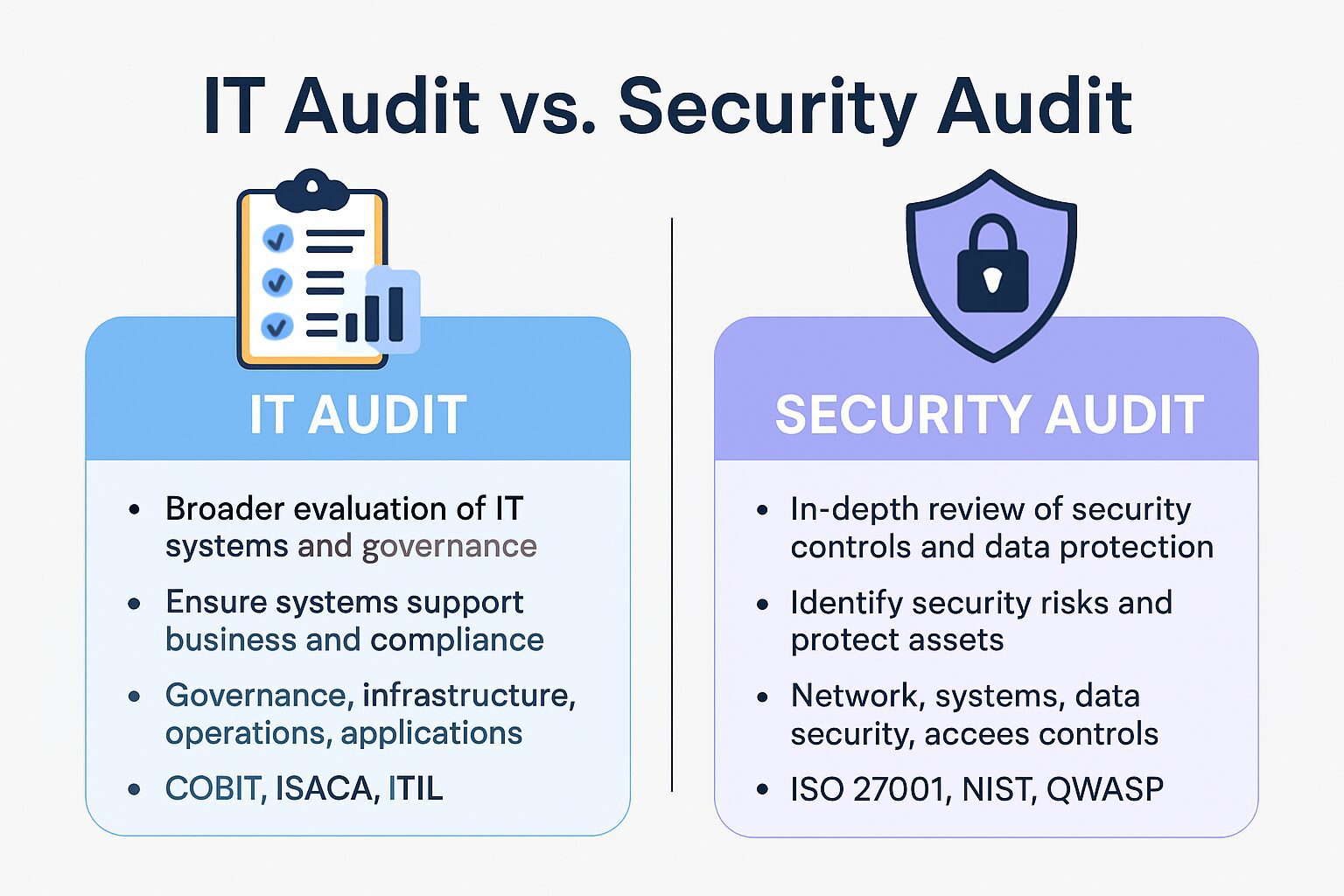In today’s technology-driven world, organizations face increasing risks from data breaches, cyber threats, and system failures. To ensure robust protection and efficient operations, regular audits are crucial. Among these, IT audits and security audits are often mentioned — sometimes even interchangeably. However, these two audits serve different purposes and focus on distinct areas.
Let’s explore the difference between an IT audit and a security audit, their goals, methodologies, benefits, and why both are essential for business continuity and compliance.
📌 What is an IT Audit?
An IT audit (Information Technology audit) is a comprehensive evaluation of an organization’s information systems, infrastructure, and processes. The primary goal is to assess whether IT controls, policies, and operations support the organization’s business objectives and financial reporting requirements.
✅ Main Objectives of IT Audit:
Ensure the integrity and reliability of information systems
Evaluate IT governance and internal controls
Review the efficiency of IT operations
Validate compliance with regulatory standards
Detect any inefficiencies or gaps in IT resource utilization
🧩 Key Areas Covered:
IT governance and strategic alignment
Data management systems
Application controls
Backup and recovery processes
IT procurement and vendor management
IT auditors typically follow frameworks like COBIT (Control Objectives for Information and Related Technologies) and ISACA standards.
🔐 What is a Security Audit?
A security audit, on the other hand, specifically focuses on an organization’s information security posture. The aim is to assess the effectiveness of security policies, procedures, and controls in protecting confidentiality, integrity, and availability of data and systems.
✅ Main Objectives of Security Audit:
Identify and mitigate cybersecurity threats and vulnerabilities
Assess effectiveness of network and system defenses
Review access controls and authentication mechanisms
Ensure compliance with security regulations like ISO 27001, GDPR, HIPAA, etc.
Prevent data breaches and unauthorized access
🧩 Key Areas Covered:
Firewall and intrusion detection/prevention systems
Endpoint and antivirus protection
Password and identity management
Physical security controls
Incident response planning
Security audits are often technical and detail-focused, involving penetration tests, vulnerability scans, and configuration reviews.
⚖️ IT Audit vs. Security Audit: Key Differences
| Aspect | IT Audit | Security Audit |
|---|---|---|
| Focus | Broader evaluation of IT systems and governance | In-depth review of security controls and data protection |
| Objective | Ensure systems support business and compliance | Identify security risks and protect assets |
| Scope | Governance, infrastructure, operations, applications | Network, systems, data security, access controls |
| Methodologies | COBIT, ISACA, ITIL | ISO 27001, NIST, OWASP |
| Team Involved | IT auditors with financial/compliance background | Cybersecurity specialists and ethical hackers |
| Outcome | Improved IT efficiency and risk management | Stronger security posture and reduced threat exposure |
💼 Benefits of IT and Security Audits
✅ Benefits of an IT Audit:
Aligns IT investments with business goals
Improves operational efficiency
Enhances financial and regulatory compliance
Identifies outdated systems or processes
Assists in IT budgeting and planning
✅ Benefits of a Security Audit:
Detects and closes security gaps
Prevents data breaches and cyberattacks
Ensures compliance with data protection laws
Builds trust with stakeholders and customers
Strengthens overall cybersecurity framework
🤝 Do You Need Both IT and Security Audits?
Yes — both audits serve different but complementary roles. While IT audits take a broader, business-aligned view of technology and systems, security audits dig deeper into technical safeguards and threat resilience.
For instance:
An IT audit might highlight that your data backup procedures are outdated.
A security audit might discover that sensitive data backups are stored without encryption.
Organizations aiming for compliance, efficiency, and security should incorporate both into their risk management strategy. Many industries (like finance, healthcare, and e-commerce) require both audits for regulatory compliance and to maintain customer trust.
🛡️ Final Thoughts
Understanding the difference between IT audit and security audit is vital for modern businesses. While both assess aspects of your technology landscape, their goals, methodologies, and scope differ significantly. A well-rounded audit strategy that includes both IT and security evaluations helps in:
Managing risk proactively
Ensuring compliance with ever-evolving standards
Boosting overall IT performance and data protection
In an era where cyber threats and technological complexity are growing, conducting regular IT and security audits is not just recommended — it’s essential.







